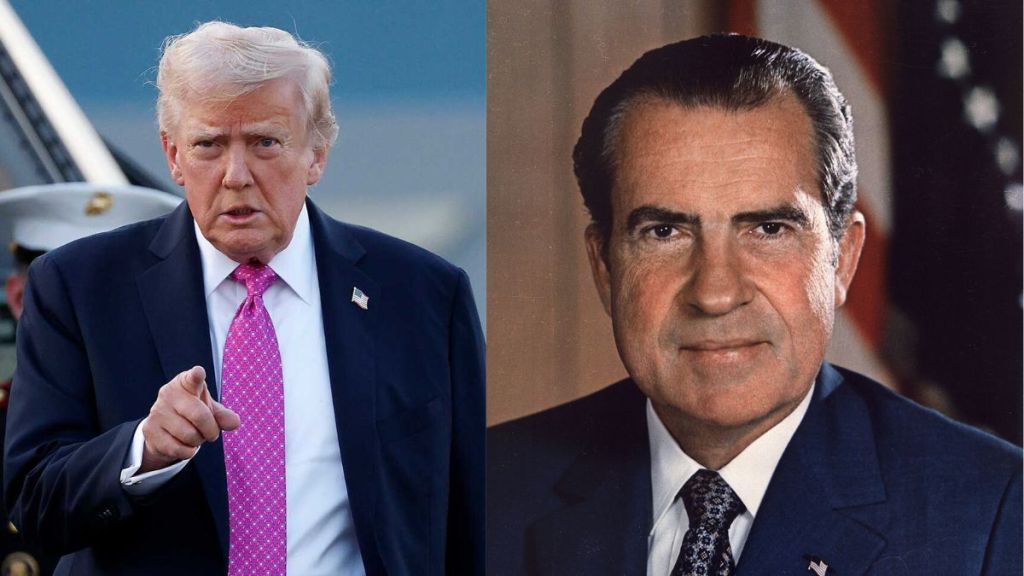In a single social media post on Sunday, Donald Trump reignited a new front in his long-running war on history.
Taking to Truth Social to attack long-time critic Sen. Adam Schiff (D-Calif.), the president made a strong claim that the Watergate scandal long upheld as a watershed moment of American political accountability was an “illegal hoax.”
The post read, “The Ukraine Impeachment (of me!) Scam was a far bigger Illegal Hoax than Watergate,” Trump wrote. “I sincerely hope the necessary authorities, including CONGRESS, are looking into this! Adam ‘Schiffty’ Schiff was sooo dishonest and corrupt. So many laws, and protocols, were violated, and just plain broken!!! President DJT.”
With that statement, Trump did not just lash out at a political opponent. He sought to upend a cornerstone of American civic memory, one where a president resigned under the weight of undeniable evidence, bipartisan condemnation, and looming impeachment.
What is the Watergate scandal?
The Watergate scandal was a major political scandal in the United States during the early 1970s, involving illegal activities and misuse of power by President Richard Nixon’s administration.
It began with a break-in at the Democratic National Committee (DNC) headquarters located in the Watergate complex in Washington, D.C., on June 17, 1972, when five men connected to Nixon’s re-election campaign were arrested for attempting to wiretap and bug the DNC offices.
Under mounting pressure and facing near-certain impeachment, Nixon resigned from the presidency on August 8, 1974, becoming the first US president to do so.
New narrative for an old scandal
Watergate, for decades, has stood as a rare success story in the American democratic system. The term itself has become shorthand for scandal.
But more than that, it represented a triumph of accountability: congressional oversight, a free press, the justice system, and a public unwilling to accept abuse of power.
In Trump’s view, the real scandal is not what Nixon did but how today’s political system unfairly targeted him. Watergate becomes not a cautionary tale, but a political tool.
According to Trump, Nixon “left,” not because he faced certain removal from office, but because he made poor tactical choices. The wrongdoing becomes blurry, almost irrelevant. “He may have been guilty,” Trump has mused, but that is as far as he will go.
Instead, Trump has repeatedly suggested that the impeachment efforts against him, particularly the 2019 inquiry over his attempts to pressure Ukraine into investigating Joe Biden, were not just political missteps by Democrats, but crimes in themselves.
By calling his impeachment a “bigger illegal hoax” than Watergate, Trump recasts himself as the victim of historic injustice, while diminishing the real, documented crimes of the past.
It is a tactic he has used time and again, undermine credible investigations, elevate conspiracy theories, and invert the roles of perpetrator and victim.
Why Trump is calling it a ‘hoax’?
The irony is not lost on political historians. Trump’s political style has long echoed elements of Nixon’s rhetoric, “law and order,” “the silent majority,” and appeals to cultural grievance and fear of societal decline.
But where Nixon ultimately stepped aside amid scandal, Trump has chosen to confront it head-on, not by answering allegations, but by redefining the narrative.
Trump and his allies routinely frame everything from the investigation into Russian election interference, to Hillary Clinton’s email use, to supposed government plots like “Obamagate,” as more serious than Watergate regardless of evidence.
A meme shared by Trump ally Roger Stone, himself a self-styled Nixon acolyte, captures the worldview: side-by-side images of Nixon and Barack Obama, with the caption, “One of these men is the most corrupt president in US history. The other is Richard Nixon.”
Historians and legal scholars alike have noted that Nixon’s resignation came not from partisan vendetta, but after a special prosecutor’s investigation, bipartisan outrage, and the release of taped evidence that revealed the president’s active participation in a criminal cover-up.
Several of Nixon’s top aides were convicted. Nixon himself received a presidential pardon, not because he was innocent, but to help the nation move on.
Trump’s first impeachment centered on his solicitation of foreign interference in a US election, pressuring Ukrainian President Volodymyr Zelenskyy to announce an investigation into his then-political rival, Joe Biden, in exchange for military aid.
The facts were supported by testimony from career diplomats and White House officials. Still, Senate Republicans largely stood by Trump, and he was acquitted.
By now likening Watergate to a hoax, Trump seeks to collapse the distance between a historically proven scandal and the allegations against him, further muddying the waters for voters.
Trump’s attempt to recast Watergate as a hoax also tell us a deeper and growing concern, the erosion of shared facts in American political life.

